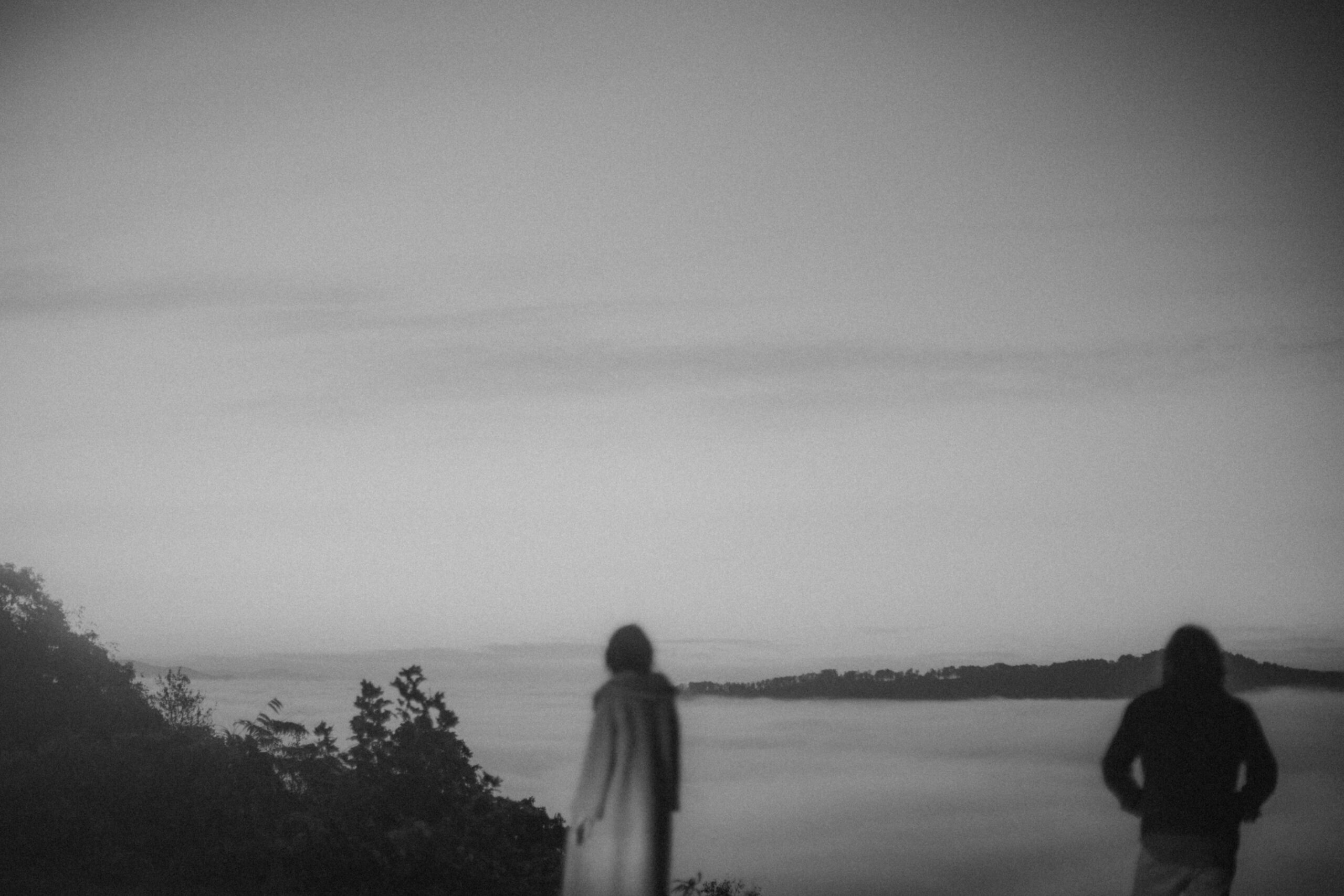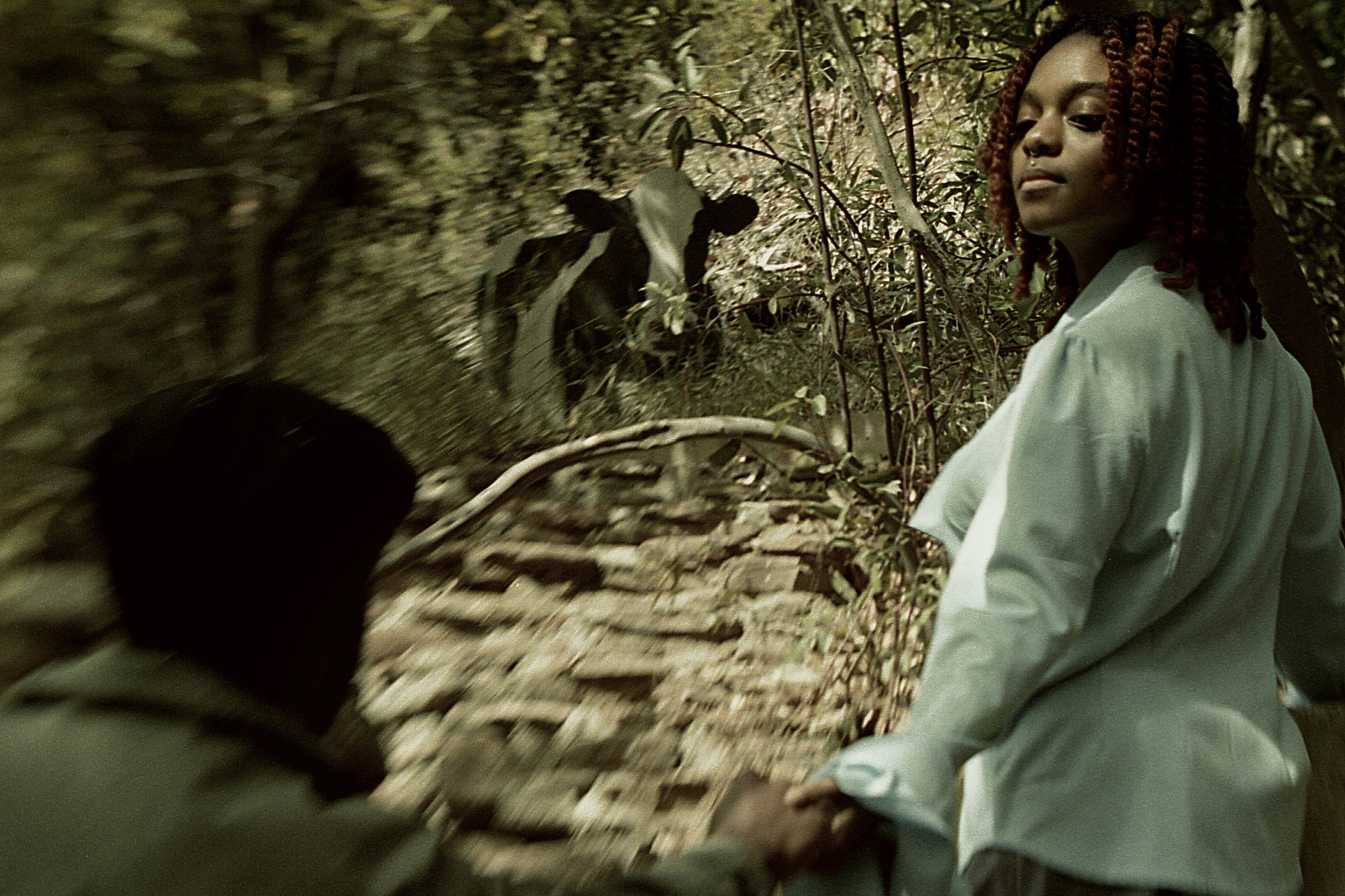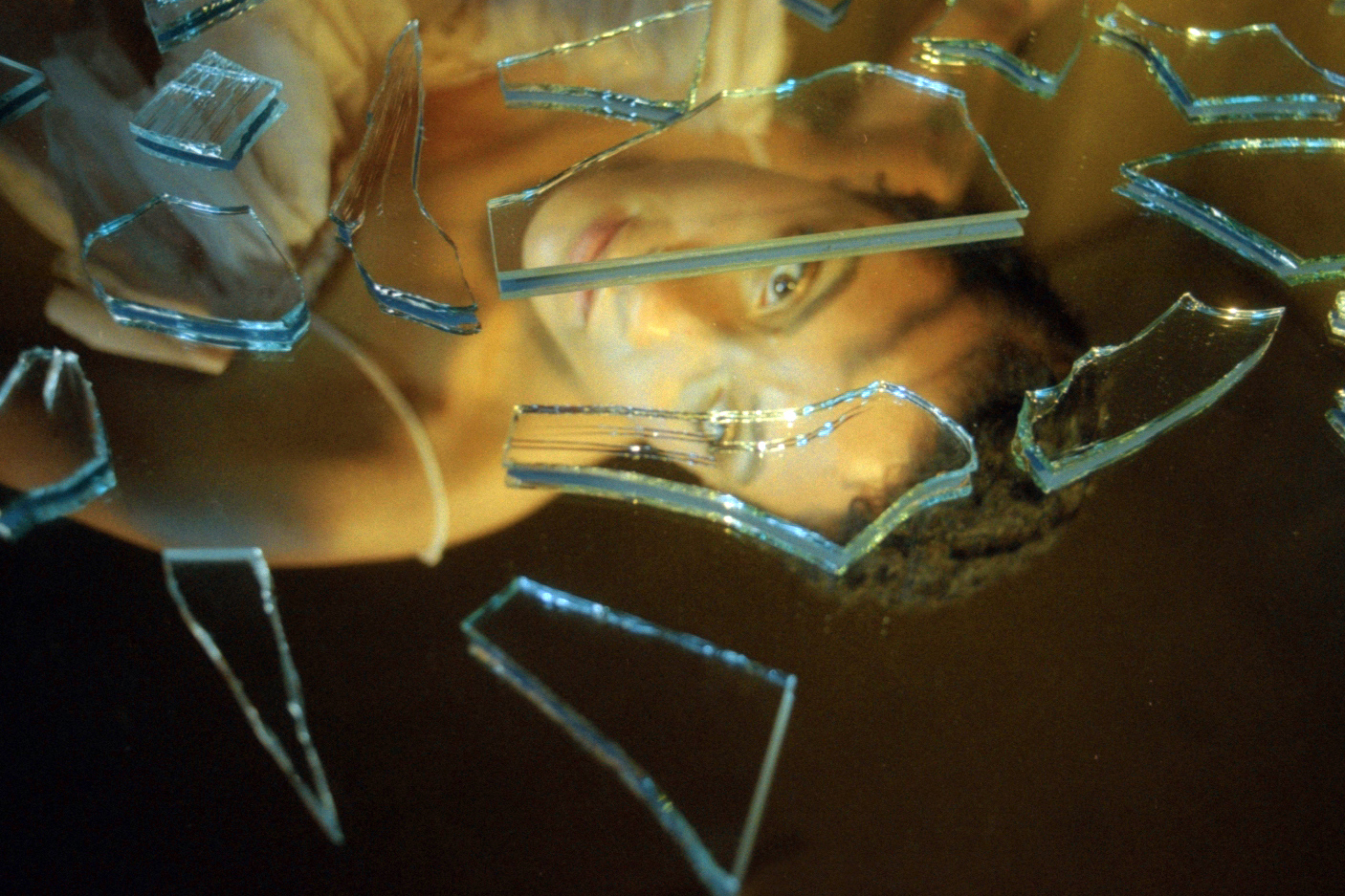
The Pig Kill
TEXT NICKY LOOMIS
SUMI INK ON PAPER GIANFRANCO CIOFFI
The plan was simple: man yourself with huge knives and storm into the forest, half-drunk. Gabor’s mom helped me and the men into our costumes. It was reverse strip poker, each of us looking more and more like roadkill. We took a shot of palinka with every piece of fur we put on––at least we were warm.
I hadn’t earned my mask yet, so Gabor’s mom draped a fox pelt around my neck. “It goes back to the days of Turkish battle,” she said, “We wore our Mohacs masks and the stupid Turks thought we were demons. They fled back to where they belong.” Today, we would reclaim the Dobogok Pilis forest to hunt wild pigs.
“The earth’s heart is there,” Gabor said. And something about Attila the Hun.
“Now, everyone, come here and we will stand in a circle to discuss the plan. Tibor, wake the fuck up!” Gabor shouted.
Csaba, Gabor, Tibor: relative, relative’s “business partner,” guy I was fucking. I asked Gabor to ask his mother if I could go look in the mirror. She pointed at the house.
I studied myself and blew hot air on the cold glass. I couldn’t think of what to draw so I looked out the window and watched Gabor and Tibi drink palinka in their huddle. I stared at a picture of a patron saint I didn’t recognize taped to the back of the bathroom door and pictured all kinds of horrible things while I sat and peed.
Maybe they had a plan to do away with me out in the forest. They’d tell my Dad I’d wandered off drunk one night down the Danube and got kidnapped by Roma. Or that I jumped off the bridge. Both were believable. People would say, “Unfortunate, but not surprising.”
I was sweating in my fur and starting to panic. But they need me. That’s what Gabor had said—an American woman is a thing of value. But what exactly did he mean by that? Stop, I said to myself, flushing the post-communist toilet paper. You’re not going to be murdered. We’re family. Grandma, the one who got this whole trip started, thought it would be good for me to get away, to explore my roots. But I didn’t expect her to pass away before I got the chance.
I skipped washing my hands and joined the men. Gabor played “Eye of the Tiger” from his car, full blast. We passed around the bottle once more and I felt that familiar feeling I had experienced daily since my arrival: tipsy. Hungary was a country that liked to indulge in its pain—alcohol, its tears.
“Most, menjuk,” Gabor said, Let’s go.
We fell into line. Csaba and Gabor led us down a dirt path. Tibi grabbed my fur rump and kissed me hard when the other two weren’t looking.
“Have you ever heard of furries?” I asked Tibi.
“Nem,” he said, not asking me what they were.
“Well I feel like one,” I said, kissing him back, following the grain of his pelt’s fur, holding him tight.
“You aren’t going back to America,” he said. “You know that, right?”
The morning sun began to warm our backs as we walked. I could see my breath commingling with a pack of gnats that danced in the morning air like kernels exploding into popcorn. I tried to catch one with my hand and opened it up the way I had my whole life, to find nothing.
“What are you picturing?” Grandma would holler down at me from the balcony overlooking the pool. Other kids played softball and got their ears pierced. I swam alone, my grandma my only friend.
“I’m picturing what it would be like to be able to breathe underwater,” I’d say. We’d imagine the whole thing together. Where we’d go, what we’d do in our fantasies. I wanted to go deep: find wrecked ships, steal gold rings off a pirate’s bony finger, get lost in fields of seaweed. She just wanted to rest among the creatures in some warm body of water.
We never pictured real places or things––not when I was little, at least. After my Mom died, I’d tell her I was picturing Mom as a cloud moving over me, hovering for a moment until she drifted onward.
“She’ll come back,” she’d say. “Clouds always do.”
I began to lose my breath as we climbed deeper into the forest: up, up, and up. Tibi lit a spliff and began humming “Sunday Bloody Sunday.”
“This is just for us,” he whispered. “Csaba gets paranoid on the hash.”
“Pussy,” I said, taking a huge puff, not telling him how until I stepped foot in this country, I hated pot because of how scared it made me feel, how I once hyperventilated from it because I thought I was having a heart attack. Another time I got a Cheeto lodged in my throat. That was then, this is now. Tibi made me feel calm. I took another hit.
“Which way are we going?”
“This path leads all the way to the Austrian border,” he said, describing how the Hungarian-turned-Soviet henchmen used to guard it, posted up in their watchtowers, trolling their sight-line for “enemies of the people,” or Soviet traitors, the barrels of their guns like the snouts of hungry wolves.
“Why didn’t your family leave when they had the chance?” I asked Tibi.
“Loyalty. My great grandpa had one leg only. He wouldn’t have made it. So they stayed. People who left were dissidentch, traitors.”
Somewhere up here, right along the border, my Mom and my Grandma walked hand in hand, traitors, but alive.
“Give me some more of that joint,” I said. We passed a small clearing and reached a pond.
Across the pond, someone had set up a tent and chairs around a smoldering campfire. The leg of an animal hung in a tree drying. A guitar perched against one of the chairs. I caught my reflection in the water: stoned and swaddled in various furs, I looked like an unruly bitch.
Gabor and Csaba stood on the far edge of the bank, assessing the threat in rapid Hungarian. “Hey?” I said, which they knew now meant to switch to English.
“It looks like a gypsy camp,” Tibi translated. Twigs cracked in the bramble as we made our way closer.
The campfire was in a deep hole. Inside, a big black cauldron sat atop the pink and grey embers. Someone was cooking a kind of stew, bright red with whole potatoes bobbing at the surface.
“Hortobagos,” Gabor said. “It’s fish soup.”
“I want to try it,” I said, grabbing the ladle. For sure I was high now. “Look, there’s a Robert Ludlow book by the tent. I think they’re just camping.”
“Gypsies can’t read. Everyone knows this,” Csaba said. “Come, before they spot us. Keep your weapons up and let’s go,” he said, holding a pair of black nunchucks up to the sky like a torch. He kicked the guitar sideways and spit in the stew as we marched on.
The water along the bank was so clear I could see to the bottom. Something long and black slithered and then disappeared. A bird nosedived deep into the pond, trying to catch the water snake.
My grandma once caught a snake in our pool—I remember the way she smashed its head against the cement, then tossed it in the bushes. She didn’t know I was watching.
We didn’t always have money, but once we did, my Dad decided we should build a pool. Construction had begun with the sacrificial ripping up of my favorite magnolia tree. It took days to saw the tree into pieces, to hack its waxy green-haired branches off, slice its trunk into thirds and finally, to rip out its fanged roots and churn it into a sweet sawdust whose smell lingered for days.
I’d spent hours in that tree, tied ropes to it, carved my initials in it. But I didn’t love that tree as much as the idea of having a pool, so I protested in silence, watching its slaughter, my face pressed against a window in my grandma’s wing of the house. Strange to think I once climbed to the top of that tree and then swam to the bottom of it; I was in the sky where there was once a tree, then in the earth where there is now a pool.
I took a deep breath and simmered the exhale out like I was burning down the memory.
A couple in matching Gore-Tex approached us on the path, each donning trekking poles, their pants swishing in unison as they walked. The man had a pair of binoculars dangling from his neck; the woman grabbed his arm and froze when she saw us.
“Don’t move,” the man whispered to her. A Brit. “Joe Esh-tet, beszel Angolul?” Good morning, do you speak English? He waved and attempted a smile as he spoke.
“Nem!” Csaba said, giving a small grunt. Hungarians loved to assert their superiority by pretending not to know English. It was their last form of control.
“I think they are wild gypsies,” the man said to his wife, excited.
“Hello, I’m Lily,” the woman said.
“Menz aj anyad picsajaba, Angolul!” Csaba screamed.
They flinched the way Brits do—like a bee flew by their faces, posture unflappable. He stormed past them, making his signature walrus cry, and we imitated him. I trudged ahead with the group, turning around to see the couple taking turns looking at us through the binoculars.
“What did you say to them back there, Csaba?” I asked.
“I told those stankin’ Brits to get back into their mother’s cunt, Menz aj anyad picsajaba! Stupid Angolules. The only thing worse than an American is a Brit.”
“Enough,” Gabor said, sick of Csaba’s elocution. “The pigs are waking up.”
We panted in unison as we curled slowly up a summit overlooking an open pasture. The bright sun was diffused by a gentle breeze. This was the best I had ever felt high.
Gabor explained that the pig we were trying to kill had eluded hunters for years. It had red curly hair and a missing eye—only a Magyar, a Hungarian, could kill this pig.
“You kill that pig, and you get your own throne instated in the Palace,” he said.
“Why do I have to do this?” I asked.
“You want to be a Hungarian, then act like one.”
“Give me more palinka.” Fuck me, I did not want to kill a pig.
Gabor handed me a knife. It was heavy, so I let it hang by my side as we circled back down, wading through tall grass still wet with dew.
We hid behind a stand of trees for what felt like an hour. I had no watch, no cell phone, none of the normal worldly trappings that had seemed to become useless the moment I landed here. All I had was a huge knife and a 50-proof buzz to get me through this shit show. I tried to catch Tibi’s attention—at the time I pictured us buying a fishing hut together and having sex all day. Later, I’d look back and think, He was the uncircumcised one.
Just then, the pigs ambled to the pond. There were six of them and they seemed at peace, lapping water, shaking the flies off their backs in gentle wiggles. No one spoke, no one made hunter grunts. I couldn’t see any of the men and thought maybe they had snuck away, maybe it was all a big joke, the American tourist getting old-country’d. I was always the one who fell asleep at the beach. The one who other kids would decide to play tricks on, moving their beach towels and chairs twenty feet away so when I woke up I’d be all alone, and they’d be out of sight, laughing at me.
A nunchuck waved from behind Csaba’s tree, signaling me to attack. The next moments happened like this: a trio of walrus cries, masked men holler and scatter, nunchucks flailing, everyone gone now except for a single pig, my pig, who stares at me with one beady black eye, barely visible through his red, curly pig bangs. He edges backwards into the pond as I gain on him. He’s seen this before and must sense that I haven’t, because he’s huffing, not squealing, huffing, as he backs into the pond, ass first.
I waded in up to my knees and watched the pig begin to swim in circles. He looked like he knew what he was doing, so I couldn’t understand why he didn’t just swim to the other side. He swam straight toward me, hard, like he was going to hurt me. Instead, his eye locked with my eyes—telling me, I’m ready to go now. Someone had taken a part of him, the same way someone took a part of my Grandma, and now, a part of me. If she could kill that water snake, I could kill this pig. Things grew quiet, like the whole forest was watching. He swam up beside me and even cocked his head in offering, as though he knew it’d be painless. I lifted the knife and stabbed it deep into his throat as hard as I could. No sound, just the slow stream of blood inking the clear water.
The men joined me at the bank of the pond.
“Yes! You are a Magyar!” Csaba screamed, making all kinds of noises, laughter—man sounds.
I started bawling. I left the one-eyed pig there in the water and sat on the shore, wet, cold, horrified by what I had done. Tibi sat beside me and hugged me, not saying anything. Csaba and Gabor both patted me on the head and went to drag the pig out of the water before it sank.
“Why did you make me do that?”
“You needed to do something,” Tibi said.
Later, we stood together under the evening sky, cobalt blue, exploding with stars, a sliver of a waning moon. We warmed ourselves around a firepit. I stared up at the sky and wondered where my Grandma was up there, resting, perhaps, in a nebula of her own making, purple shocks of lightning zagging toward me, closer now, and yet further and further away.
You may also like
The Symposium of Drowning
There is no greater crowd pleaser than a pretty dead girl, especially the drowned variety. You know
The Hedley Kow
It was a queer hour. In or around even-set the fog rose and poured through the cleft in the hills to
Mirror, Mirror
I was looking in the mirror and I saw what I think was a girl but she was very big. She had a roun




